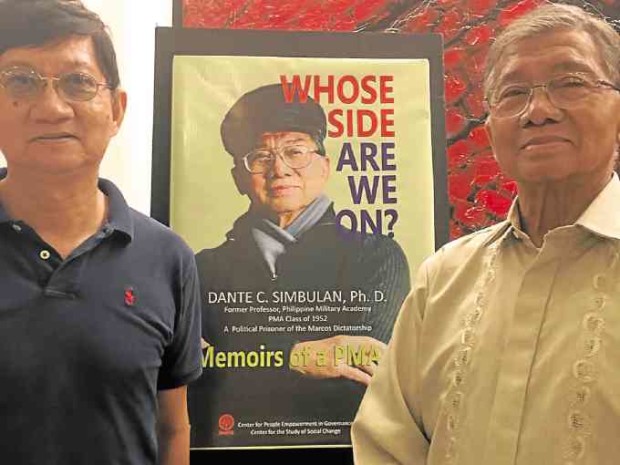
Dante Simbulan, shown here with son Roland, left the Philippine Military Academy in 1967 feeling disillusioned.—TONETTE OREJAS
Dante Simbulan is 86 years old and undergoes dialysis thrice a week. But he still manages to summon the energy to publish his memoirs that uses a haunting question for a book title: “Whose side are we on?”
“I have not given up on my dream,” Simbulan told his audience of activists, former revolutionaries and military officers who came to the launch of the book on Oct. 25 at Holy Angel University in his home province, Pampanga.
That dream, in his own words, is to see the Armed Forces of the Philippines and Philippine National Police “serve the people, not the ruling elite.”
The 304-page book is Simbulan’s contribution to reforms being undertaken by the country’s uniformed services. It allows readers an insight into his life in San Simon and Guagua towns, the insides of the Philippine Military Academy (PMA), and his role in the establishment to which he eventually turned against.
A member of PMA Class of 1952, Simbulan said he was trained as a “warrior of the status quo,” going after communist rebels and rising as an intelligence officer.
Enlightenment
The realities in the field—of people fleeing when military men come to villages, of soldiers losing their additional meal allowance to the so-called battalion fund, of not being accorded mutual respect by American sentries—prompted him to leave the military and become an educator.
Simbulan said he found enlightenment when he began examining the handful of Filipino elite who control the economy and politics. He returned to the PMA in 1965 to teach with this new perspective.
“My primary concern was that the cadets, after graduation, must not be instruments of the ruling oligarchy in exploiting and oppressing our people,” he wrote in his memoirs, taking pride in being able to introduce more subjects in Social Sciences and Humanities, and a course on Dr. Jose Rizal, the national hero. Simbulan also got activists, like Jose Ma. Sison, as lecturers.
Disillusioned
But he left the PMA in 1967, feeling “more disillusioned,” arguing that the academy was portrayed as the product of the Philippine Revolution by claiming Gen. Artemio Ricarte and Gen. Antonio Luna as its own alumni when it was basically a copy of the US Military Academy at West Point, New York.
Teaching at the University of the Philippines, Ateneo de Manila University, Maryknoll College (now Miriam College) and Philippine College of Commerce (now Polytechnic University of the Philippines), Simbulan searched for the “roots of civil strife among fellow Filipinos.”
His activism drew the ire of strongman Ferdinand Marcos who detained him for three years in 1974 without charges.
During his involuntary exile in the United States in 1980, Simbulan campaigned for an end to America’s support for Marcos and the closure of the US bases.
Simbulan, his wife Grace and their seven children endured more hardships when son Roland became a political detainee.
“With this book, I wish to inspire young cadets to live up to the PMA honor code of courage, integrity and loyalty to country and people,” Simbulan said.
In his view, this code is violated the moment a cadet sets foot at the academy. “This unquestioning obedience was shaped during ’Beast Barracks’ and in the halls of Fort del Pilar through brutal physical punishments of hazing as the usual sanctions if one does not follow orders. The young cadet was conditioned to act like a robot, an automaton, in carrying out orders of his upperclass superiors,” he wrote.
[I hope that] in the era of a strongman copycat, a more humane military leadership will not follow illegal, unconstitutional orders from above.
Weaving life, history
Simbulan said this treatment explains why many PMAers violated the rights of critics and enemies of a “corrupt and tyrannical dictator during martial law.”
He believed this was also the reason for corruption in the AFP and PNP.
Simbulan spent 20 years collating his life story and accounts of events unfolding in the country, including World War II. It took him five years to write the book while living in northern Virginia at the border of Washington.
“The title reflected a question that disturbed my mind,” he said.
Rodolfo Salas, former chair of the Communist Party of the Philippines and leader of the New People’s Army (NPA), credited Simbulan for infusing nationalism into the PMA. Simbulan’s former students, Lt. Victor Corpus and Lt. Crispin Tagamolila, defected to the NPA before the declaration of martial law in 1972.
During the book launching, historian Dr. Jaime Veneracion said: “At the PMA, he (Simbulan) was thinking of it as an educational institution only to discover to his dismay that what was being taught was institutionalized violence, the degradation of the person, the development of a 5-year-old mind.”
“[The] PMA, instead of raising the bar in the development of a true man, was in fact the institution that reinforced what may be called primate heritage. When Dante was exposed to a truly educational institution, he developed a higher order of thinking and the appreciation of refined values that truly reaffirmed his sense of humanity,” Veneracion said.
He hoped that “in the era of a strongman copycat, a more humane military leadership will not follow illegal, unconstitutional orders from above.”
Veneracion said the AFP and PNP need to serve the people because dominant families still have a monopoly of power in government, there is gross social and income inequality, and the human rights situation is deplorable.